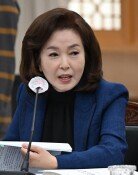Emigration fair draws thousands of Koreans
Emigration fair draws thousands of Koreans
Posted March. 05, 2001 13:57,
``Mommy, what is emigration?``
``Going abroad to live.``
``Then, I won`t have to go to hagwon (cram school) and I can play as much as I like.``
On the last day of the nation`s first emigration fair Sunday, which was held at the Convention and Exhibition (COEX) Center in southern Seoul, a mother with her two elementary schoolchildren, a boy and girl, had to answer a host of questions from them while gathering information at several booths set up at the site.
``Classes for my two kids cost 700,000 won a month. When they enter middle school, it will cost 500,000-700,000 won a month each for private lessons. We can`t afford that on the money we make,`` she said.
``Some friends of my husband have already gone overseas. Everybody thinks of emigrating when they reach their 40s.``
Alongside the emigration fair, the 12th exposition for students going abroad also was held. The two fairs attracted a combined 45,000 visitors.
Emigration for education:
An intensely competitive school environment for children combines with the backbreaking cost of extracurricular instruction to drive students and their parents out of the country. The number of children going overseas to study unlawfully, not accompanied by their parents, numbered 1,650 in 1999. The figure reached 705 in the first two months of 2000 or 43 percent of the total for 1999. The number of emigrants increased 21 percent in 2000 to 15,307 from 12,655 in 1999.
The emigration fair was crowded with agents specializing in emigration for study purposes, fed no doubt by the surging tide of ``education emigration.`` An official of the Korean Emigration Consulting Agents Association said seven or eight out of ten who came for counseling on emigration claimed they were motivated by the desire for better education for their children. Even those consultants were overwhelmed by the zeal of parents to take their children out of the country in hopes of providing them with better schooling.
The cost of education here is a major consideration for those seeking to emigrate. ``My husband`s meager salary as a public servant is simply not enough to pay for private lessons for my two children, one third grader and one fifth grader,`` said a housewife getting ready to move to the United States. ``We hope by emigrating to become better off financially.``
There are a variety of reasons for the growing dissatisfaction with the state of schools in Korea: lack of consistency in the government`s educational policy; cutthroat competition for entrance into advanced schools; school violence; bullying and the erosion of classroom morale. Most people feel there is little hope of improvement in these areas.
A Korea Development Institute opinion poll of 1,155 parents and educators last November showed that 88.3 percent of respondents were concerned about the adverse effects of an education overwhelmingly focused on college entrance and with the excessive cost of off-campus instruction. Respondents blamed both of these factors for plunging Korean education into a state of crisis. Wavering and confusing educational policy was cited as an impediment to the development of the education system by 49.5 percent of respondents. Only 45.2 percent expressed hopes for any improvement.
Disillusionment with political and economic conditions:
Another factor in the growing public desire to emigrate is the political and economic conditions here.
A small businessman said he plans to go to a country where the apparel and sewing industries, which are declining here, have a brighter future. He said it is too difficult to run a small business of any kind in Korea.
American exhibition visitor Kevin Peters, 35, said, ``Korean education concentrating on preparations for entrance exams looks like a caricature. Korean students enjoy no freedom. I would try to go abroad if I were a Korean myself.
Lee Jin-Yeong ecolee@donga.com







